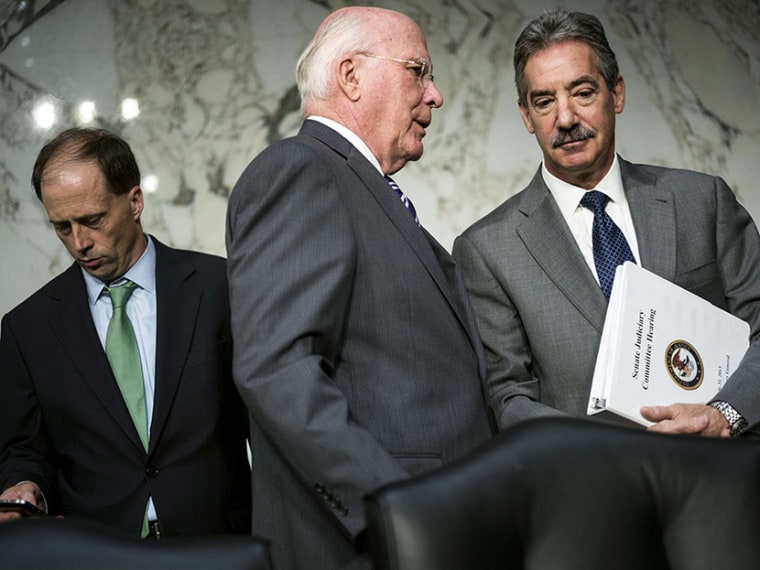President Obama met with a group of lawmakers Thursday including several prominent critics of the National Security Agency's surveillance activities. The meeting comes after weeks of harsh bipartisan criticism from Congress and a narrow administration victory in the House against lawmakers who wanted to defund a key section of the Patriot Act.
Lawmakers have grown increasingly skeptical of the Obama administration's defenses of NSA surveillance. Wednesday, Democratic Senate Judiciary Committee Chair Patrick Leahy told administration officials testifying before the committee that "If this program is not effective it has to end. So far, I’m not convinced by what I’ve seen."
The meeting, which an administration official tells NBC News was requested by the president, included Democratic Sens. Ron Wyden of Oregon and Mark Udall of Colorado, who had been warning for years that the Obama administration had not been forthright about the scope of government surveillance. The White House also invited Wisconsin Republican Rep. Jim Sensenbrenner, the self-identified author of the Patriot Act who for years was one of its most ardent defenders before turning critic after exposés were published in the Washington Post and The Guardian, to the meeting.
Defenders of the NSA's data collection were also there, including Senate intelligence committee chair Dianne Feinstein of California, and the ranking Republican on the Senate intelligence committee Saxby Chambliss of Georgia. Their House counterparts, Republican intelligence committee chair Rep. Mike Rogers of Michigan and Democrat Dutch Ruppersberger of Maryland will also be there, as will Republican House Judiciary Committee chair Rep. Bob Goodlatte.
With the exception of Sensenbrenner, all of the House members in attendance voted against the reform attempt last week by Republican Rep. Justin Amash and Democratic Rep. John Conyers, both of Michigan, to bar bulk collection of Americans' data under the Patriot Act. Afterwards, Rogers and Ruppersberger released a statement saying the meeting had been "productive" and that "There was agreement in the room the NSA call record program (Section 215) is not a domestic surveillance program. We will continue to work through the August recess on proposals to improve transparency and strengthen privacy protections to further build the confidence of the American public in our nation's counterterrorism programs."
Wednesday the Office of the Director of National Intelligence released the original secret court order detailing a request to a Verizon subsidiary for the communications data of all their customers. They also published documents showing that lawmakers were told as early as 2009 about the extent of the NSA's data collection. White House press secretary Jay Carney emphasized Congress' approval during the press briefing Thursday.
"The reauthorization of the Patriot Act and FISA, these are known facts," Carney said. "Congress has known about them. The public has known about them."
After the White House meeting Thursday, Wyden told The Guardian that his "focus was on the urgency of reform" and that "the false choices that you could either have security or liberty, I don't think, is a case that the American people would accept." Perhaps deliberately, Wyden's language echoed that of another Senator in 2007, who said that the Bush administration put "forward a false choice between the liberties we cherish and the security we provide." It was Barack Obama.
